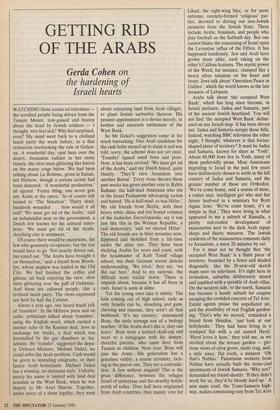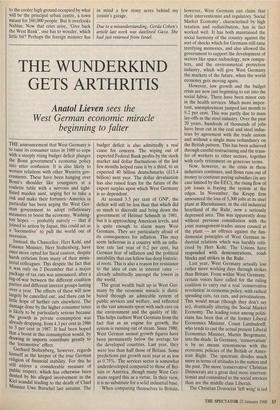GETTING RID OF THE ARABS
Gerda Cohen on
the hardening of Israeli hearts
WATCHING those scenes on television the terrified people being driven from the Temple Mount, tear-gassed and beaten about the head by Jewish soldiers — I thought, why feel sick? Why feel surprised, even? My mind went back to a civilised lunch party the week before, in a fine restaurant overlooking the vale of Gehen- na. A wonderful day, opal haze over the desert, Jerusalem radiant in her stony beauty, the olive trees glittering like knives on the massy crags below. We had been talking about La Boheme, given in Italian, not Hebrew, though a certain accent had been detected. 'A wonderful production,' all agreed. 'Funny thing, one never gets any Arabs at the opera.' So of course talk turned to 'The Situation'. Thirty dead, hundreds wounded . . . how would it all end? 'We must get rid of the Arabs,' said an industrialist near to the government, a Dutch Jew known for his cultural enter- prise. 'We must get rid of the Arabs. Anything else is sentiment.'
Of course there would be exceptions, the few who genuinely co-operate, but the rest would have to go. Not exactly driven out, but eased out. 'The Arabs have brought it on themselves,' said a friend from Brook- lyn, whose nephew was knifed in the Old City. We had finished the coffee and gateau; sat back enjoying the view, olive trees glittering over the gulf of Gehenna. And these are cultured people, this a civilised lunch party. The views expressed are held by half the Cabinet.
About a year ago, one heard much talk of 'transfers'. In the Hebrew press and on radio, politicians talked about 'transfers', using the English word, which carried a sinister echo of the Kastner deal, Jews in exchange for trucks, a deal which was forestalled by the gas chambers in Au- schwitz. By 'transfer', suggested the depu- ty Defence Minister, Michael Dekel, we could solve the Arab problem. Cash would be given to intending emigrants, or their future Arab homelands. Michael Dekel has a winning, no-nonsense style. Unfortu- nately his name is tainted with land deal scandals in the West Bank, when he was deputy to Mr Ariel Sharon. Together, under cover of a sham legality, they went about extracting land from Arab villages, to plant Jewish surburbia thereon. His present appointment is a device merely, to further and entrench settlement of the West Bank.
So Mr Dekel's suggestion came in for much barracking. One Arab candidate for the cash bribe turned up to claim it and was told, sorry, the scheme does not yet exist. 'Transfer' lapsed amid boos and jeers. Now, it has been revived. 'We must get rid of the Arabs,' said my Dutch friend, quite bluntly. 'They'll turn Jerusalem into another Beirut.' Every stone thrown these past weeks has given another vote to Rabbi Kahane, the half-mad American who sits in the Israel Parliament advocating racism and hatred. 'He is half-mad: so was Hitler.' My old friends from Berlin, with their heavy white china and ten bound volumes of the Judisches Encyclopaedia, say it was just like this in the Weimar Republic, a real democracy: 'and we elected Hitler'. The old friends are in their seventies now, kippered and blotched from a life-time under the alien sun. They have been studying Arabic for years and years, with the headmaster of Kufr Yassif village school, but their German accent defeats understanding. 'We tried,' they say, 'we did our best.' And to my surprise, the difficult tears trickle down. There is anguish about, because it has all been in vain. Israel is sunk in slime.
Yet the young ones take it calmly. The kids coming out of high school, rude as only Israelis can be, slouching and gum- chewing and raucous, they aren't all that bothered. 'It's my country,' announced Boaz, the surly teenage son of a biology teacher; 'if the Arabs don't like it, they can leave.' Boaz wore a knitted skull-cap and went to a synagogue with his dumpy, cheerful parents, who came here from Tunisia as children. Next year, Boaz will join the Army. His generation has a graceless virility, a coarse certainty, lack- ing in the parent one. They are a contradic- tion. A Jew without anguish! This is the great difference, between the refugee Israel of yesteryear and the swarthy hotch- potch of today. Over half have originated from Arab countries; they mainly vote for Likud, the right-wing bloc, or for more extreme, recently-formed 'religious' par- ties, devoted to driving out non-Jewish elements from the Jewish State. These include Arabs, feminists, and people who play football on the Sabbath day. But one cannot blame the coarsening of Israel upon the Levantine influx of the Fifties. It has happened insidiously. Jew and Arab have grown more alike, each taking on the other's Caliban features. The mystic power of the Word, for instance, clamped like a heavy silver talisman on the heart and brain: Jews talk about 'Operation Peace in Galilee', which the world knows as the late invasion of Lebanon.
Arabs talk about 'the occupied West Bank', which has long since become, in Israeli parlance, Judea and Samaria, part of the ancient Jewish heartland. You will not find 'the occupied West Bank' deline- ated on any Israeli map. It has been driven out. Judea and Samaria occupy those hills. Indeed, watching BBC television the other night, I thought, whatever is that foetus- shaped piece of territory? It must be Judea and Samaria, known for short as 'Yosh'. About 60,000 Jews live in Yosh, many of them perfervidly pious. Most Americans migrating to Israel in the past few years have deliberately chosen to settle in the hill country of Judea and Samaria, and the greater number of those are Orthodox. 'We've come home, said a cousin of mine, a rather nice, intelligent girl who met her future husband in a seminary for Born Again Jews. 'We've come home, it's as simple as that.' They were living in what appeared to me a suburb of Ramalla, a pretty red-roofed development of maisonettes next to the dark Arab repair shops and dainty minarets. The Jewish residents of the maisonettes commute daily to Jerusalem, a mere 20 minutes by car.
For it must not be thought that 'the occupied West Bank' is a finite piece of territory, bounded by a fence and shaded diagonally, like the 20-year-old sketch maps seen on television. It's right here in Jerusalem, suburbia deliberately mixed and jumbled with a sprinkle of Arab villas. On the western side, to the north, Samaria has become a handy suburb for couples escaping the crowded concrete of Tel Aviv. Estate agents praise the unpolluted air, and the possibility of real English garden- ing. 'That's why we moved,' remarked a friend from Hendon, 'just look at our hollyhocks.' They had been living in a cramped flat with a cat named Herzl. 'Herzl loves it here,' they told me, as we strolled about the terrace garden — glo- rious views of olive grove, sunlit crag, and, a mile away, flat roofs, a minaret. 'Oh that's Nablus.' Palestinian workers from Nablus have actually built the stone-clad apartments of Jewish Samaria. 'Why not?' demanded my friend shortly. 'If they didn't work for us, they'd be bloody hard up.' A new main road, the Trans-Samaria high- way, makes commuting easy from Tel Aviv to the cooler high ground occupied by what will be the principal urban centre, a town meant for 160,000 people. But it overlooks Nablus. Now that cries arise, 'Give back the West Bank', one has to wonder, which little bit? Perhaps the foreign minister has in mind a few stony acres behind my cousin's garage.
Due to a misunderstanding, Gerda Cohen's article last week was datelined Gaza. She had just returned from Israel.



























































 Previous page
Previous page